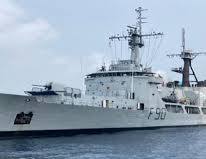
Despite challenges, Nigeria’s Maritime has potentials for growth says Research Centre
.
..highlights strategic impact by NIMASA, MARAN’s Advocacy, TANTITA on security
By Babatunde Aremu
A Group, Sea Empowerment Research Centre has said that Nigeria Maritime industry in 2024 boasts necessary fundamentals enough to engineer growth and development if properly harnessed.
It however noted that the industry is hampered by several challenges including the issue of safety and security with piracy, sea robbery and illegal bunkering, while highlighting the role played by NIMASA and Tantita Security in tackling these monsters.
In the area of shipping which is quite strategic, the research showed that the shipping sector is still navigating some challenges, but acknowledged that there are also opportunities for growth and investments.
“In fact, there have been some high-value deals in the sector, such as the Maritime Reporters Association of Nigeria, MARAN’s order for shuttle tankers which suggests that investors are still interested in the industry,” the review declared.
The research center arrived at the conclusion in its New Year Bulletin featuring ‘CRITICAL REVIEW OF THE NIGERIA MARITIME INDUSTRY (PERFORMANCES AND ISSUES) IN 2024.’
It was signed by Fwdr Eugene Nweke,
Head of Research, Sea Empowerment Research Center RGT.
The Center declared firstly that with the right investments, policies and regulations, the industry can play a crucial role in driving the country’s economy and connecting Nigeria to the global market.
Secondly, it noted that to improve the industry’s global ranking, it is essential to address the myriad of challenges plaguing it and implement reforms that will enhance the efficiency and competitiveness of Nigerian ports.
It also affirmed that the government must work towards creating a more favourable business environment with a stable and predictable foreign exchange rate to attract investments and stimulate growth in the maritime sector .
In reviewing how the maritime industry fared in 2024, the Center undertook a general overview of the industry, the ports global ranking, the critical sectors and the impact of the foreign exchange rate policy especially, in the international trade arena, the port sub industry, and as a way forward, proffered solutions and suggestions for 2025.
It’s review of the industry on the one hand shows significant growth and potential, with Nigeria being a major oil-producing and exporting country.
It underlined however, that despite the industry’s potentials, it faces several challenges that hinder its growth and development.
As regards global ranking, the reviews shows that “Presently, the Nigeria maritime industry is ranked 48th in terms of merchant shipping fleet, with the country’s shipping sector contributing an insignificant 1.6 million tonnage to the world’s merchant shipping fleet in 2019.
“As for the global port ranking, Nigeria’s ports are ranked 183rd out of 185 countries in terms of efficiency, according to the World Bank’s Trading Across Border indicator.
“This ranking is due to various challenges such as delay of import/export processes, unofficial charges, human interface, technical breakdown, and security concerns that are prevalent in Nigerian ports.
“Thus, while port predictablity and competitiveness appears a foul cry, the ports delivery corridors is also bedeviled by human barrier elements, impeding the fluidity of prompt cargo delivery, the review said, adding, “Indeed, this global ranking is more or less a testimonial, constituting and pointing at how our maritime industry faired in 2024, ” the review added.
The Centre also submitss that the Nigerian government needs to take urgent steps to address the issue of the unregulated foreign exchange rate and provide a stable and predictable environment for investors to operate in.
It also took a critical look at the regulatory agencies at the port, their performances, failings and areas for necessary correction.
Among other things, the research center disclosed that the port import throughput is on the downward indicators as well as ship calls to the port when compared to the previous year’s record.
While it agreed that the regulatory frameworks in place such as the Nigerian Maritime Administration and Safety Agency (NIMASA) Act, the Coastal and Inland Shipping (Cabotage) Act and the Merchant Shipping Act have helped to shape the maritime sector, the center righly noted that more needs to be done to address the challenges facing the industry.
.

